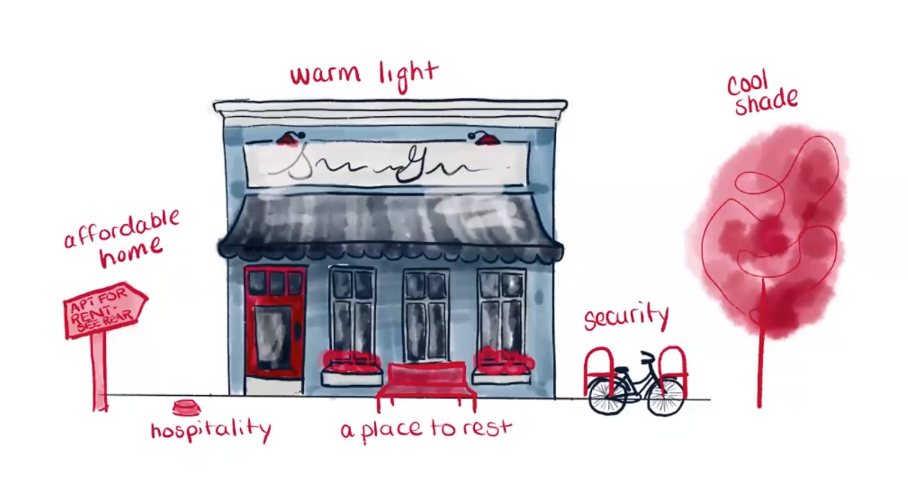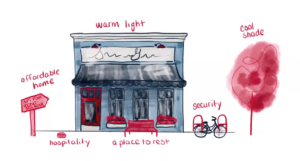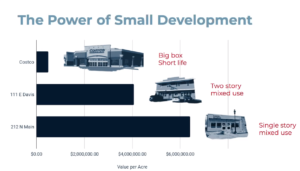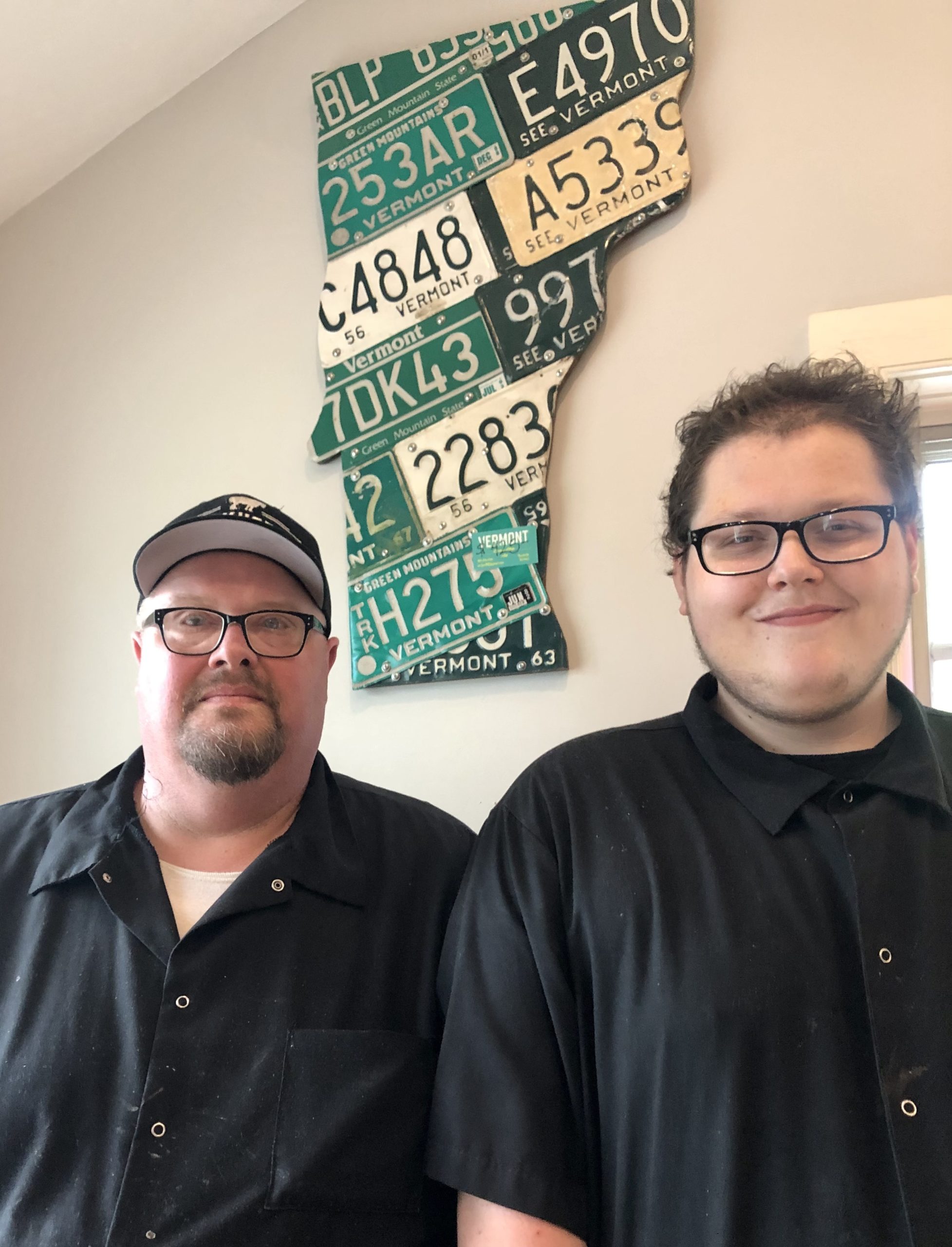
Investing in Bellows Falls Through Alternative Development Model Driven by Locals
Photo Credit (above): Incremental Development Alliance
By Duane Case, Resident and RIDWG member
When we mention “development,” many people tend to think of large new construction: the business park, the office complex, large clusters of homes or apartments. In this model, a few big players make the plans, provide the investment, and reap much of the benefits. What happens if we instead focus on a lot of individual “micro-developers,” each pursuing their own tiny development interests and goals. What is the effect on those individuals and their community? Are there advantages to this approach, and is it worth pursuing?
The Incremental Approach
Incremental development is a conceptual alternative to typical large-scale development projects. Large-scale projects are characterized by high dollar investments, big impacts on the community, and large returns needed to attract big-dollar capital. The pressure to get a relatively quick return on investment tends to push developers to build their projects where costs and regulatory barriers are minimized: often in large open areas outside of town centers. This also tends to drive developers to copy what has worked before and in other places; there is little incentive to experiment and innovate against a backdrop of predictable profits.
Incremental development takes a small-scale approach. While large projects can run to tens of thousands of square feet, incremental development promotes many micro-sized “developments.” It encourages low-investment low-barrier solutions. Because investments are so much lower, the number of individuals and businesses that can participate is much greater. Many people of modest means can become invested in their own property and community in new ways — both financially and personally. The approach encourages unique projects, individual opportunity, and diversity. It flows from the premise that many individuals working for their own individual good result in a good community: one that promotes opportunity, quality of life, and personal and financial growth.
What Small-Scale Development Actually Looks Like:

Photo Credit: Incremental Development Alliance
From Pop Up Tent ——————————————————————-> to Three Story Building
Elements of Small-Scale Development:

Photo Credit: Incremental Development Alliance
The Power of Small Development Versus Typical Big Box Development:

Photo Credit: Incremental Development Alliance
The Analysis
Bellows Falls (in particular) possesses some unique challenges and opportunities. The history of the Village has resulted in many small properties. There are relatively few opportunities for large-scale projects within the Village, even if big developers were otherwise incentivized to consider construction here. The fact that there are many small properties with unique structures full of character makes the area ripe for micro investment, one property, one building, at a time. There are barriers and challenges however, some perceived, some real, that have limited this sort of development for years.
The Incremental Development Alliance (IncDev) is a non-profit organization which has been working with the Town of Rockingham (with support from Brattleboro Development Credit Corporation and others) over several months to study how the concepts of incremental development might be applied to improving the community. The Alliance was brought on board to study some of the challenges; to quantify unseen opportunities that may be present; and to begin to educate and encourage community members to pursue the kind of development and progress that the Village and the community would like to see.
The Potential
In early 2021 the IncDev made a comprehensive study of the local commercial and residential markets. They looked at current supply and demand, and projected what additional needs could be met that are currently going unanswered. They found a significant “gap” between the business and housing opportunities that presently exist, and the demand that could be filled if the supply was available.
A big takeaway from the Target Market Analysis is that the potential in both commercial and housing sectors surpasses what is currently being offered. Current residents have a hard time finding desirable and affordable homes to purchase or rent; and the study found that many more people would like to live here but cannot find what they need. Businesses in town sometimes struggle to find workers to fill current job openings, never mind filling jobs that they would like to create. Many employees must travel significant distances to work in Rockingham; and some of those would like to move in-town, given the opportunity. There is also potential for growth in new business ventures, especially in very small operations and “Mom and Pop” businesses. A lack of attainable premises and supportive infrastructure limits their ability to get started and grow.
Another aspect of IncDev’s education was to explore opportunities to increase the supply of building stock so that potential demand could be met. For instance: one of the village’s strengths is its older, iconic buildings, many of which are currently vacant, underutilized, and in need of maintenance and upgrade. Other opportunities were presented as well, such as developing new lofts, townhouses, cottages and accessory dwellings; and restoring or replacing homes that are currently vacant.
The community might be willing to make investments in some of these, if they understood that there is real possibility of seeing them well-occupied. Governments, lenders and non-profits might be willing to play a constructive role in supporting small-scale investors when they see the possibility of growing the community and realizing a fair return on investments.
The Barriers
There are many barriers to this kind of development, and IncDev laid out some of these and presented ways to address them. One significant problem is the regulatory difficulties that stand in the way of small developers moving ahead with projects. Current zoning regulations frequently make it difficult to build the types of structures that already exist and help define the look and feel of the town. These regulations also add complexity and uncertainty to efforts to better utilize the buildings that we already have. Zoning regulations send a signal to the market as to what kind of development is desired; and the default for many would-be developers is to build to that code.
Town regulations could be analyzed to see if they can work better to support small-scale development. The Town of Rockingham is currently updating its Zoning By-laws and Town Plan. This provides a perfect opportunity to suggest regulation updates based on incremental development principles.
Moving Forward
The effort going forward is both individual and collective. Each stakeholder will make decisions that seem wise and prudent to themselves. But the community can come together to collaboratively define goals and chart a path. What do we want our town to look like and feel like? How can we support the residents and businesses who are already here? How can we increase the opportunities for those who would like to join the community but so far have not found a way in?
The incremental approach encourages the community to consider these questions and more, to formulate clear goals, and to engage each other and their leaders to find ways to support the desirable outcomes. Citizens should engage government leaders to examine whether regulations are creating barriers to a healthy, vibrant, and welcoming town. Investors and lenders could be encouraged to think “outside the box,” and look for opportunities that might be missed in their normal operations.
A core principle of incremental development is community evolution. It asks us to identify what is most valued in town, and to encourage us to maintain and restore those features. It seeks to find ways to re-configure historical structures and existing infrastructures to meet present needs. It hopes to build neighborhoods that are well-loved and usable. It looks to citizen stakeholders to take pride in their homes and businesses, encouraging them to invest time and resources in their own properties. It asks governments and non-profits to help preserve what exists and make targeted additions and alterations in support of the goals of the community and its citizens.
The Rockingham Incremental Development Working Group (RIDWG), made of up residents and stakeholders, has committed to taking the lessons learned from the IncDev process and carrying the momentum into the future to create an evolution that all residents can be proud of.
RIDWG is following up on IncDev’s spot analysis of zoning regulations in Bellows Falls Village, and one at a time is looking at other zoning regulations and bringing that analysis and Small-Scale Development friendly recommendations to the Planning Commission, who are in the process of reviewing and rewriting the Zoning Regulations. There are other town goals and policies that need to be analyzed through this same small-scale development lens. That format is the Town Plan which is currently under review by the Planning Commission and would similarly benefit from RIDWG participation and recommendations.
RIDWG has taken many other steps since it first met in June 2021. Some of the ideas and actions this group is focusing on are a carriage house survey for potential Accessory Dwelling Unit (ADU) opportunities, sharing the target market analysis with realtors and bankers, sharing educational materials and documents with residents from the IncDev work, and creating some educational workshops such as a pro forma training and multifamily homeownership class.
Do you love Bellows Falls and are interested in making incremental improvements to your neighborhood? Have you tried to make changes but are prevented by zoning regulations in adding to or upgrading your property? Are you a small-scale developer interested in this concept? Join the Rockingham Incremental Development Working Group (RIDWG). We meet monthly to discuss and work on these issues in town.
Email Sarah Lang for more information (slang@brattleborodevelopment.com).
Incremental Development Alliance (IDA), a non-profit alliance of practitioners, helps identify where policies and practices are unnecessary barriers and partners with local organizations to improve the financial and regulatory ecosystem for small development projects. “Today, city-building is dominated by large developers with institutional investors who build in big chunks like subdivisions and shopping centers. However, the neighborhoods we love most tend to be ones that were built gradually over generations. That is what we mean by incremental development: small projects by local people over a long period of time. At IncDev, we call these small projects STEP Buildings. STEP Buildings are both a process and a product. They are the one-step-at-a-time approach to building cities that improve with age. They are also a suite of time-tested building types that we all know and love.”
IDA has been hired to provide direct technical assistance to the Town of Rockingham. This initiative is partially funded and staffed through Brattleboro Development Credit Corporation’s Southern Vermont Economy Project, made possible through USDA RCDI (Rural Community Development Initiative). These recorded sessions are part of the three-month direct technical assistance. The technical assistance is also funded by Vermont Council on Rural Development, Vermont Natural Resources Council, Preservation Trust of Vermont, Vermont Housing and Conservation Board, and Vermont Community Foundation.
Featured Photo Credit: Incremental Development Alliance



